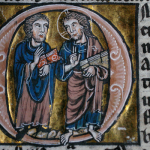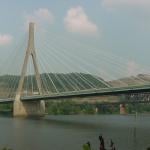THIS WAY FOR THE GAS, LADIES AND GENTLEMEN: Three very scattered points on this excellent collection of short fiction by a Polish Holocaust survivor.
1. This book is a lot better than it has to be. With any book about actual horrors, the subject matter alone will command attention. This Way for the Gas is spare and almost affectless, which I guess you’d expect, but an individual sensibility and talent comes through very strongly.
2. There’s a lot of portrayal of complicity. Specifically, the narrator (whose name and circumstances link him with the author, Tadeusz Borowski) often gets through the horror of Auschwitz by laughing at others worse off than himself. It’s ferocious and effective, never hammered on too hard, never overdone, just an unmerciful picture of how one person changed. …There’s also a lot of emphasis on how life worked in the death camps: the ways people found to create some kind of structure or community in a place designed to prove that humans can be made completely helpless, and anything at all could be done to them.
3. For whatever reason, I kept contrasting the portrayal of nature in these stories with Shusaku Endo’s Silence, about a missionary in Japan during a period of intense persecution. In Silence, the narrative is really tightly internal, tied to the missionary’s thoughts and confusions, but now and then it will swoop outward and focus intensely on a tree or rain or earth, sort of stare at that for a little while and then sink back into the missionary’s skull. This Way for the Gas weaves description into the narrative. I’m not sure if that’s a Japanese vs. Western difference. The effect on me, as a reader, was that Silence made me feel more trapped, and made nature and weather seem more “outside,” more “other,” wearying and deadly but also somehow kept apart from the cruelty of men. This Way for the Gas made me feel as if nature itself was being corrupted, enlisted to hurt humans.











